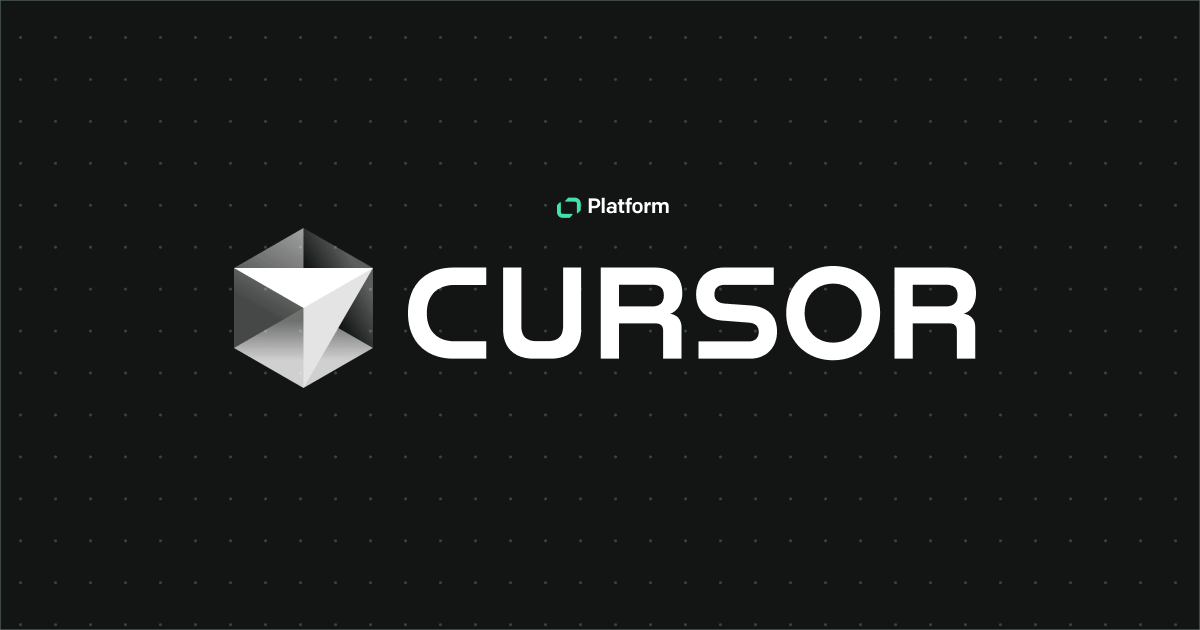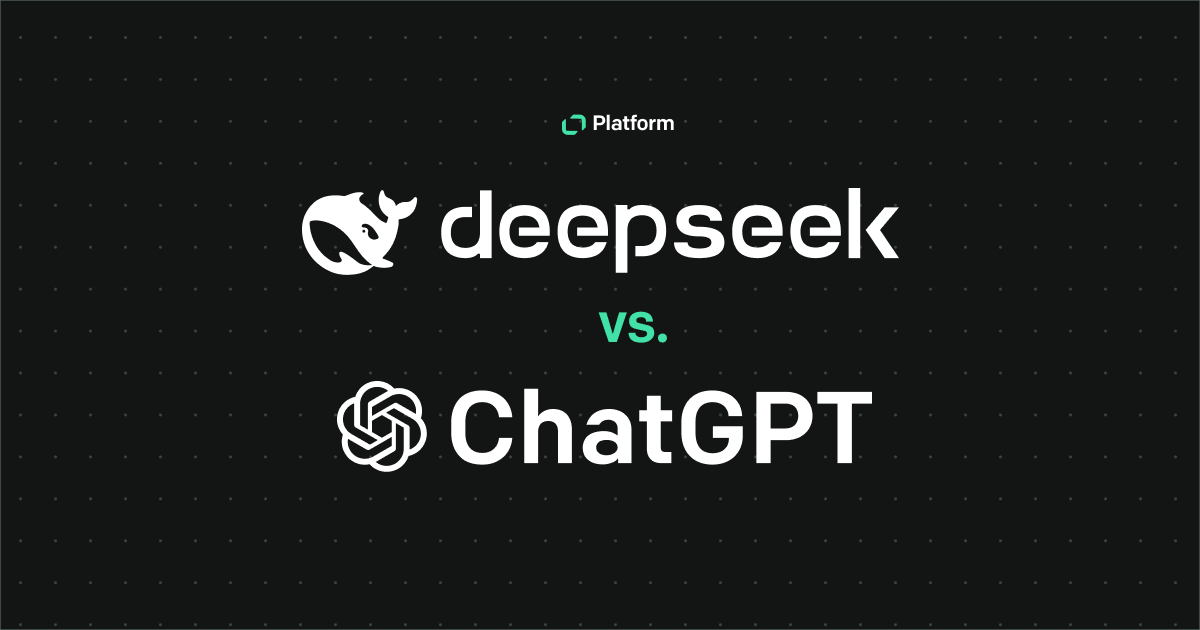Finding the right application development platform is key to building apps for custom integrations, especially when you create applications or extensions that integrate with larger systems.
Navigating these app development platforms can often feel like a maze. Some application platforms may offer robust features but come with a steep learning curve. Others might boast quick setup times but lack customization options. Some application platforms promise flexibility but fail to deliver reliable performance.
However, it's increasingly challenging to identify which application platform will best meet your needs. Each option has its own trade-offs, requiring you to sift through a sea of possibilities to find the real gems. This saturation demands a more strategic approach to selecting the right platform that aligns with your planned project features, application infrastructure requirements, and long-term goals.
This year, we took the time to really dig into a range of platforms to see what they offer and how they stack up in real-world use. We're here to share our findings and help you find a single platform that feels right for your upcoming project, one that fits your needs and feels like a tool you can rely on.
Key factors for choosing the right app development platform
We've done our fair share of integrating and enhancing various software applications. If we were to develop every solution from scratch, the time and resource costs would be enormous. Alternatively, using third-party solutions can streamline this process, though not without its own challenges. This experience has given us deep insight into what differentiates some platforms from the rest.
When choosing an application platform, here’s what to keep in mind, and these are the factors we focused on during our testing and evaluations:
- Integration capabilities: How well does the platform integrate with other systems? Seamless integration can significantly reduce development time and integration complexity.
- Scalability: Can the platform grow with your business? It’s essential that the platform can handle increased loads without performance degradation.
- Developer support and community: A robust support system and an active community can be invaluable for resolving issues and learning new programming tricks.
- Customization: How much can you tailor the platform to your needs? Flexibility in customization allows for more tailored solutions that better serve end users.
- Value for money: The costs involved must be considered relative to the features and possibilities provided. Look for platforms that offer a good balance between price and functionality.
- Speed and efficiency: Check how quickly and efficiently the platform allows you to develop and deploy applications. Delays in deployment can be costly.
- Operating system: Depending on the solution you're interested in building, you may want to consider different operating systems that the platform runs on with the support of certain functionalities.
These factors are crucial in selecting a platform that not only meets your immediate needs but also supports your long-term goals.
With that in mind, here are our picks for the five best app development platforms that are particularly suited for creating extensions for other products, such as LiveChat or HelpDesk applications:
| Platform: | Type: | Best for: | Pricing: |
| Text Platform | Messaging API | Chat extensions | Subscription-based |
| Salesforce | CRM | Customer service apps | Based on features & scale |
| Zendesk | Customer support | HelpDesk integrations | Tiered pricing |
| Slack | Collaboration API | Communication enhancements | Tiered pricing |
| Intercom | Messaging API | Marketing & support apps | Custom pricing |
Text Platform: Best application platform for real-time messaging integration and customer support
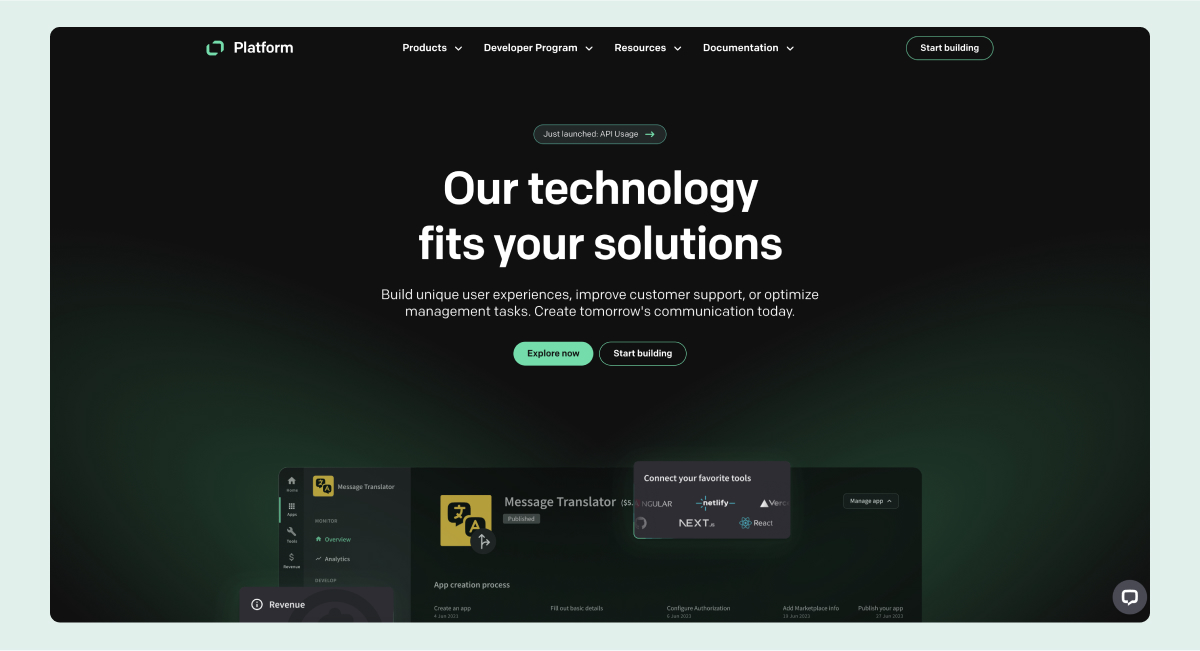
Text Platform stands out as the best platform for real-time messaging integration.Its API is specifically designed to enhance communication tools within apps, making it an ideal choice for developers looking to build or expand online communication and chat functionalities in applications like LiveChat or HelpDesk.
The platform's ability to integrate seamlessly with a wide range of existing software allows developers to add sophisticated messaging capabilities without disrupting the user experience. Developers can also use the Text Platform's Design System to match their application's components to the design end-users are familiar with.
Text Platform combines this with robust support and resources to ensure developers can maximize their integration capabilities. This comprehensive support makes it easier to deploy complex functionalities, making it a preferred choice for developers aiming to enhance interactivity and user engagement in their communication-related applications.
Text Platform also allows developers to integrate any messaging solution into their leading online messaging tools, LiveChat and HelpDesk. This allows developers to extend customer support channels with any messaging software that offers an API to create such a connection.
Pros:
- Comprehensive API support for messaging.
- Seamless integration with existing customer service platforms.
- Robust documentation and developer support.
Cons:
- Might be complex for users with no tech background.
- Pricing may be too high for small businesses.
Salesforce: Application platform for customer relationship management
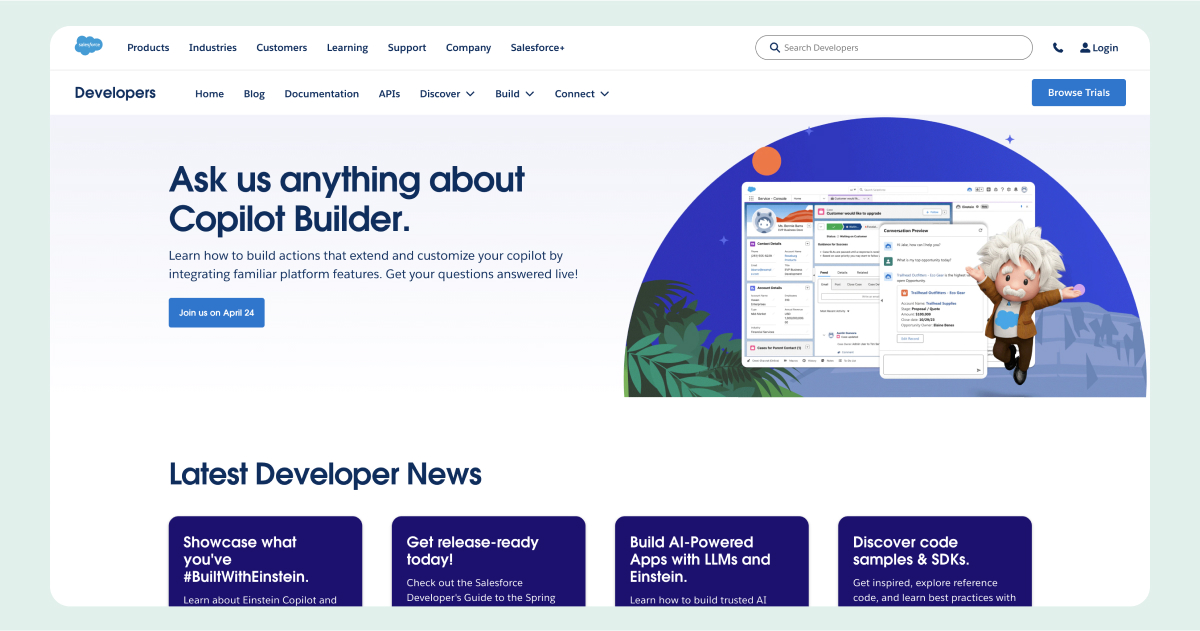
Salesforce excels as the best platform for customer relationship management due to its robust CRM capabilities and exceptional customization options. What makes Salesforce particularly stand out is its ability to manage customer interactions and provide deep insights and analytics that can drive sales and improve customer service.
Salesforce's developer platform allows developers to create tailored applications that can integrate smoothly into the broader Salesforce ecosystem, enhancing the utility and efficiency of their CRM strategies.
Also, Salesforce's vast marketplace of apps and its vibrant community contribute to a highly adaptable environment. Developers can use these resources to extend the Salesforce functionalities specific to their business needs.
Pros:
- Advanced automation capabilities that streamline complex business processes.
- Extensive in-app integration options with a wide range of enterprise applications and pre-built templates.
- Robust data security features tailored for sensitive business information.
Cons:
- Customization requires technical expertise, which can be a barrier for non-technical users.
- High total cost of ownership due to licensing and implementation expenses.
- Occasionally, complex updates require frequent adjustments to built extensions.
Zendesk: Application platform for customer support integration
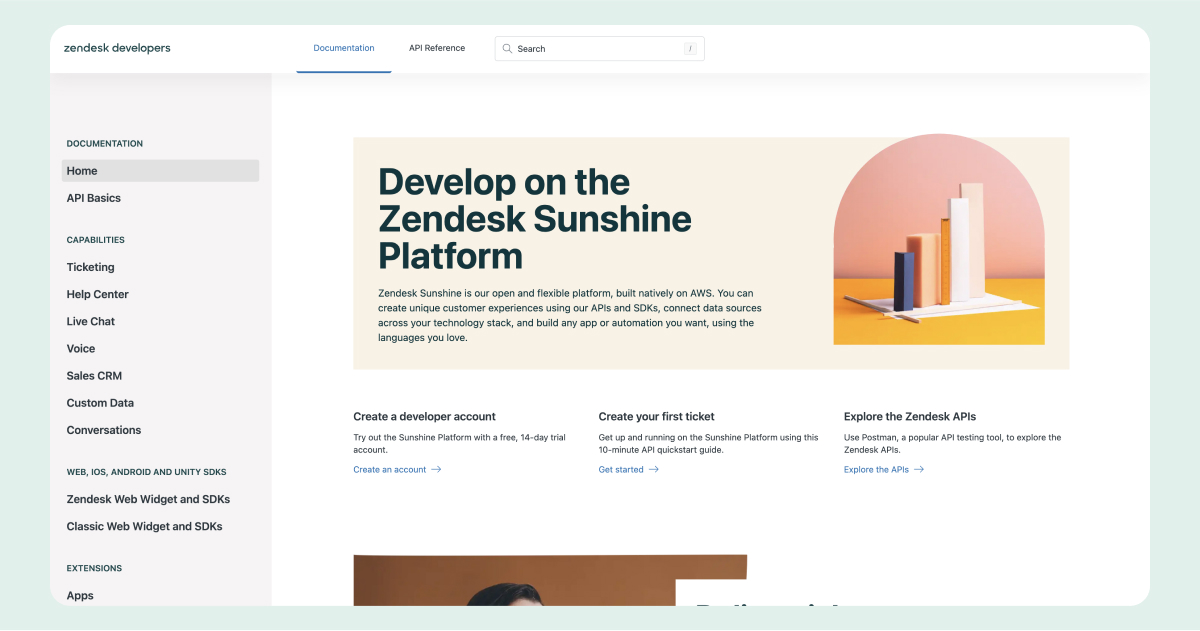
Zendesk stands out from other application platforms for customer support integration due to its comprehensive toolkit explicitly designed to improve customer service operations. Similar to Text Platform, Zendesk integrates support channels into a unified agent interface, making it easier for businesses to manage and respond to customer inquiries.
Additionally, Zendesk's strong focus on analytics provides businesses with insights into customer interactions, enabling them to tailor their services for better operational efficiency.
Pros:
- Tailored solutions for customer service workflows.
- Strong emphasis on improving customer engagement through advanced analytics.
Cons:
- Customization can be limited without advanced plan subscriptions.
- Extensive third-party app integrations within the Zendesk Marketplace, which means less need for new integrations.
- The pricing structure can escalate quickly as additional features are needed.
Slack: App development platform for team collaboration
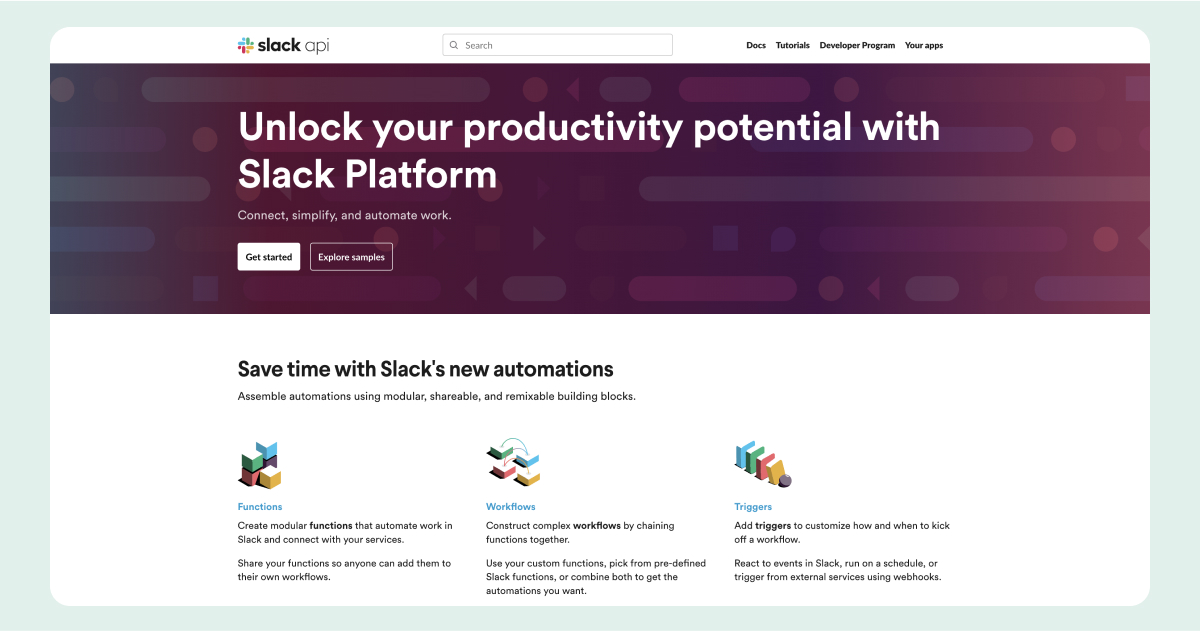
Slack is renowned by many organizations as the best platform for team collaboration due to its powerful communication tools and extensive integration capabilities. It stands out by providing a platform where organizations can communicate in real time and deploy numerous tools that help automate and streamline their workflows. This includes everything from simple reminders to complex project management tools, all accessible within the same workspace.
Slack's ability to integrate deeply with other software makes it a hub for development teams to maintain continuous interaction, enhancing productivity and project cohesion.
Pros:
- Robust integration capabilities with various productivity and project management tools.
- Real-time messaging that enhances team communication and collaboration.
- Extensive library of bots and automation that streamline workflows.
Cons:
- Can become cluttered and overwhelming for end-users with extensive use of apps and integrations.
- Can be costly for larger teams or more advanced features.
Intercom: App development platform for automated customer engagement
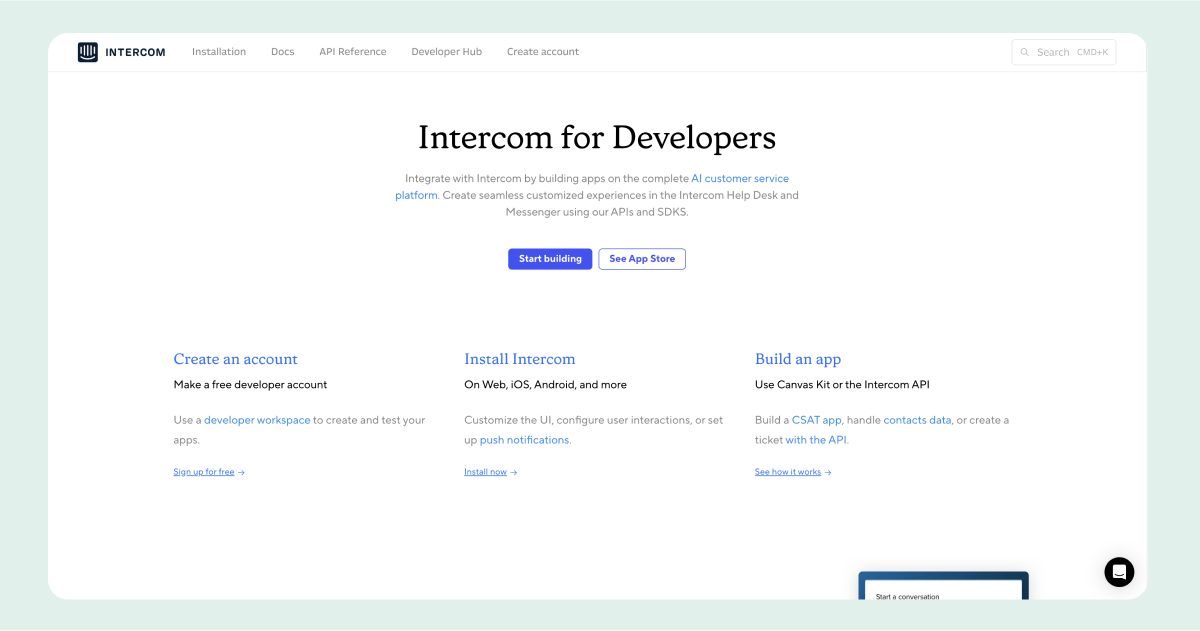
Intercom stands out for its automated customer engagement tools, which allow developers to set up sophisticated, behavior-driven messaging systems. These systems are designed to proactively engage users based on their interactions with the product.
While Text Platform excels at facilitating real-time, on-demand communication, Intercom's strength lies in its possibility for automation configuration, which can trigger messages and actions based on user behavior. This proactive approach often catches issues before they become problems and enhances user engagement without constant manual intervention.
Pros:
- Robust in-app automation for customer engagement campaigns.
- High-level customization for chatbots and messaging.
- Integration with marketing and CRM tools.
Cons:
- Higher cost for premium features.
- A steep learning curve for advanced automation setup.
- Can require significant setup time for full customization.
Which of the application platforms is right for you?
Each of these app development platforms offers unique capabilities angled at addressing specific customer needs, from real-time messaging to more advanced customer relationship management. The right choice depends primarily on the company's internal processes you want to automate and the technical requirements of your project.
However, the key factors we outlined remain essential guidelines to help you make an informed decision. These listed criteria should help you select a platform that not only fits your current needs and idea for your application but also supports your growth and adapts to future challenges.
